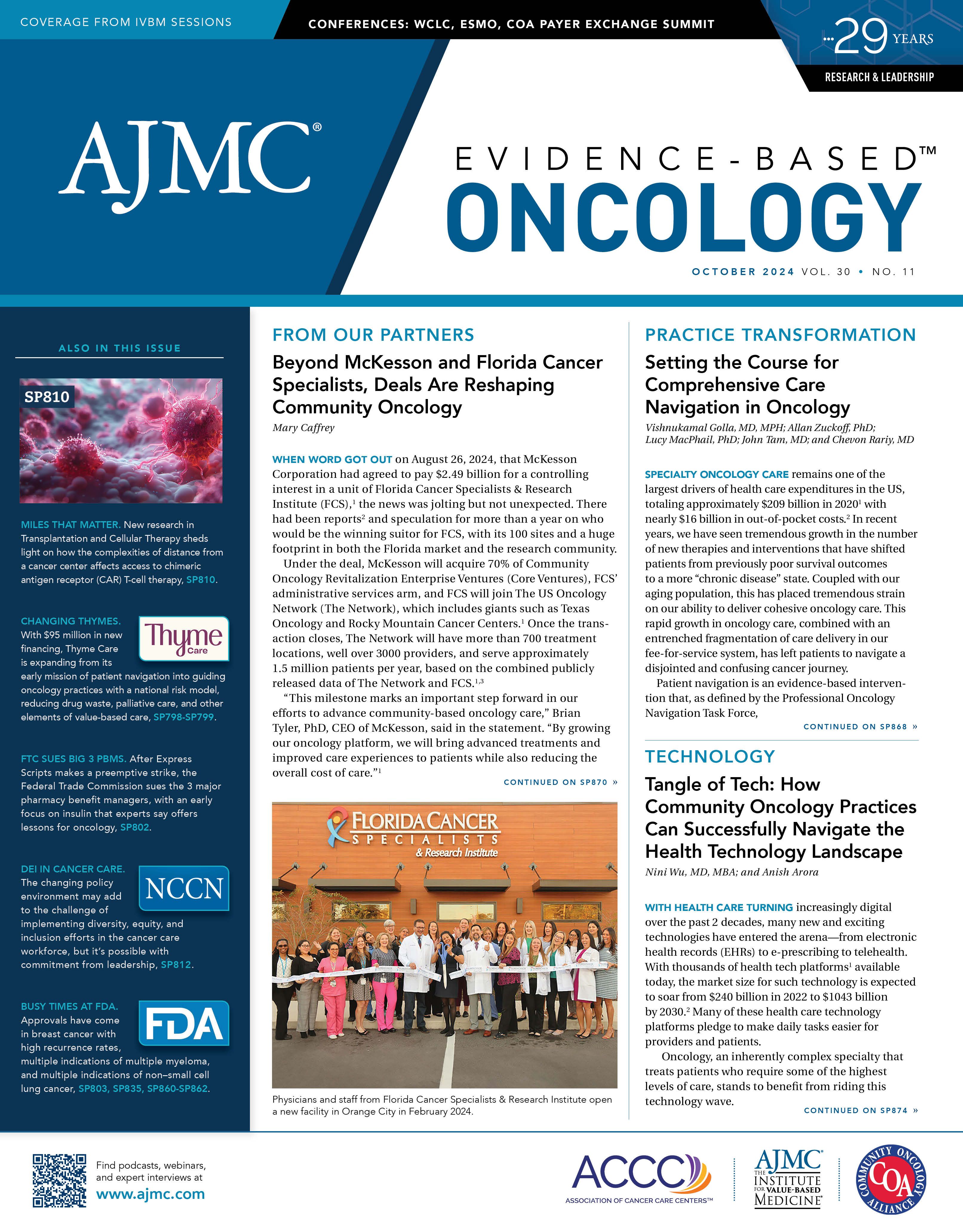- Center on Health Equity & Access
- Clinical
- Health Care Cost
- Health Care Delivery
- Insurance
- Policy
- Technology
- Value-Based Care
FDA Approves Isatuximab With VRd as First-Line Option for Transplant-Ineligible Multiple Myeloma
Isatuximab (Sarclisa) with bortezomib, lenalidomide, and dexamethasone (VRd) is now an approved option for adults who cannot receive an autologous stem cell transplant to treat their newly diagnosed multiple myeloma.
The FDA approved isatuximab (Sarclisa; Sanofi-Aventis) with bortezomib, lenalidomide, and dexamethasone (VRd) for adults who cannot receive autologous stem cell transplant to treat their newly diagnosed multiple myeloma (MM).1 The decision was supported by data from the phase 3 IMROZ trial (NCT03319667), which were presented in June at the 2024 meeting of the American Society of Clinical Oncology (ASCO).2
The approval of isatuximab in addition to bortezomib, lenalidomide, and dexamethasone was supported by data from the phase 3 IMROZ trial. | Image Credit: © ra2studio - stock.adobe.com

This new regimen adds the anti-CD38 monoclonal antibody isatuximab to the standard of care combination of VRd. Thierry Facon, MD, professor of hematology, Department of Hematology at Lille University Hospital in France, who presented the IMROZ results at the ASCO meeting, told The American Journal of Managed Care® at the time that the data were especially impressive due to the strong progression-free survival (PFS) results seen in both the investigational and comparator arms.
“The PFS benefit, to be honest, is very significant, both from a clinical and a statistical point of view,” Facon said.2 “One thing is that the VRd control arm did very well—you will not see so many VRd regimens doing so well.”
In that trial, enrollment was limited to patients 80 years or younger with newly diagnosed MM who were not eligible for autologous stem cell transplant.1 The 446 patients were randomly assigned 3:2 to receive either isatuximab with VRd or just VRd. The primary end point was PFS as assessed by independent reviewers, and the quadruplet regimen delivered, with a 40% reduction in risk of disease progression or death (HR, 0.60; 95% CI, 0.44-0.81; P = .0009). At 60 months, PFS rates were 83.2% in the isatuximab-VRd arm and 45.2% in the VRd arm.2 The median PFS was not reached in the isatuximab-VRd arm vs 54.3 months (95% CI, 45.2–not reached) in the VRd arm.1
The secondary end points included complete response, which was achieved by 74.7% of patients receiving isatuximab and 64.1% of those who received VRd.2 Another secondary end point was minimal residual disease (MRD)–negative disease status among those with a complete response, and this too favored the isatuximab group (55.5% vs 40.9%; P = .003).
When the IMROZ results were presented at the European Hematology Association Congress shortly after the ASCO meeting, they sparked excitement that the European Medicines Agency (EMA) will begin to consider MRD negativity a primary end point, following the example of the FDA, whose Oncologic Drugs Advisory Committee endorsed that change for accelerated approvals in the US.3
“I cannot speak for EMA, but I anticipate that it will be the same for us in Europe, so MRD will become an end point, at least in the beginning for accelerated approval, but…we will move from PFS to MRD assessment,” Facon said at the plenary abstract session of the European Hematology Association Congress.4
Adverse reactions occurring in at least 20% of participants included upper respiratory tract infection, diarrhea, fatigue, peripheral sensory neuropathy, and pneumonia,1 but no new safety signals were seen.1 Grade 3 or greater treatment-emergent adverse events were seen in 91.6% of patients taking isatuximab-VRd and 84% of those taking VRd.2 The incidence of serious adverse events leading to discontinuation was similar between the arms, at 22.8% and 26%, respectively.
The approved dosing of isatuximab is 10 mg/kg body weight, delivered as an intravenous infusion.1
References
- FDA approves isatuximab-irfc with bortezomib, lenalidomide, and dexamethasone for newly diagnosed multiple myeloma. News release. FDA. September 20, 2024. Accessed September 20, 2024. https://fda.gov/drugs/resources-information-approved-drugs/fda-approves-isatuximab-irfc-bortezomib-lenalidomide-and-dexamethasone-newly-diagnosed-multiple
- Caffrey M. IMROZ: adding isatuximab to SOC in transplant-ineligible newly diagnosed multiple myeloma cut risk of disease progression or death 40%. AJMC®. June 3, 2024. Accessed September 20, 2024. https://www.ajmc.com/view/imroz-adding-isatuximab-to-soc-in-transplant-ineligible-newly-diagnosed-multiple-myeloma-cut-risk-of-disease-progression-or-death-40-
- Durie BGM. A historic turning point: ODAC unanimously votes in favor of MRD testing as an early endpoint in myeloma clinical trials to support accelerated approvals of new treatments. International Myeloma Foundation. April 18, 2024. Accessed September 20, 2024. https://www.myeloma.org/blog/dr-duries/odac-unanimously-in-favor-mrd-testing-early-endpoint-myeloma
- Mattina C. Hematology from the European perspective: MRD negativity emerges as key outcome. AJMC. June 20, 2024. Accessed September 20, 2024. https://www.ajmc.com/view/hematology-from-the-european-perspective-mrd-negativity-emerges-as-key-outcome

